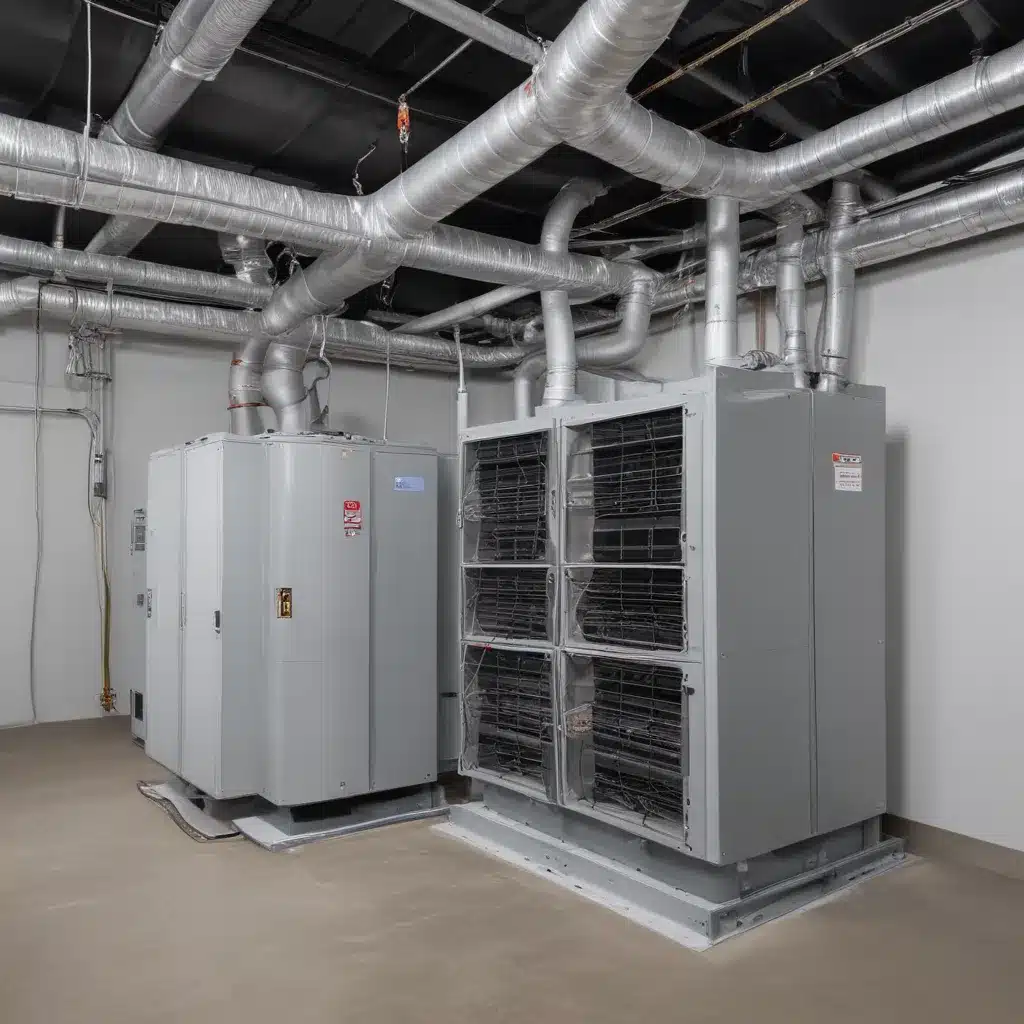
Integrating Smart Technology into Commercial HVAC Systems
As the commercial landscape continues to evolve, the integration of smart technology into Heating, Ventilation, and Air Conditioning (HVAC) systems has become a game-changer for building owners and facility managers. In our 10 years of HVAC service experience… These advanced solutions are revolutionizing the way we control and maintain indoor environments, offering unprecedented levels of efficiency, comfort, and sustainability.
The Rise of Smart Building Technology
At the heart of this transformation lies the emergence of smart building systems – a comprehensive ecosystem of technologies that work together to optimize the performance and functionality of commercial spaces. These systems encompass a wide range of innovations, including Building Automation Systems (BAS), data analytics platforms, and cloud-based monitoring solutions, all designed to create a seamless and efficient building environment.
One of the key drivers behind the adoption of smart HVAC systems is the pursuit of energy efficiency and sustainability. Large commercial buildings are significant contributors to energy consumption and greenhouse gas emissions, and improving their energy performance is a crucial priority. By integrating smart HVAC systems and chillers, building owners and facility managers can minimize energy waste, lower operating costs, and decrease their overall environmental impact.
Unlocking the Potential of Smart HVAC Systems
Smart HVAC systems leverage a range of advanced technologies to enhance their performance and responsiveness. At the core of these systems are sophisticated sensors and IoT (Internet of Things) devices that gather real-time data on factors such as temperature, humidity, occupancy levels, and air quality. This data is then fed into building automation systems, which use algorithms and machine learning models to analyze the information and make intelligent decisions about the HVAC system’s operation.
Optimizing Occupancy-Based Climate Control
One of the standout features of smart HVAC systems is their ability to adapt to changing occupancy patterns. Traditional HVAC systems often operate on fixed schedules or manual adjustments, leading to inefficient energy usage and inconsistent comfort levels. Smart HVAC systems, on the other hand, can leverage occupancy sensors to detect the number of people in a given area and adjust the temperature and airflow accordingly. When a space is unoccupied, the system can automatically lower or raise the temperature to conserve energy, while ensuring a comfortable environment when the area is in use.
Integrating Weather Forecasts for Proactive Adjustments
Smart HVAC systems can also incorporate weather forecast data to make proactive adjustments to indoor temperatures. By accessing real-time weather information, these systems can anticipate changes in outdoor conditions and adjust their settings accordingly. For example, if a heatwave is predicted, the system can pre-cool the building during off-peak hours to double-check that a comfortable environment when occupants arrive. Similarly, if a cold front is expected, the system can adjust heating settings to maintain optimal indoor comfort.
Optimizing Energy Efficiency During Off-Peak Hours
One of the significant advantages of smart HVAC systems is their ability to optimize energy usage during off-peak hours. These systems can identify periods of low occupancy or reduced activity and adjust HVAC settings accordingly. By lowering heating or cooling levels when the demand is low, smart HVAC systems can significantly reduce energy consumption and extend the lifespan of HVAC equipment by minimizing wear and tear.
Enhancing Indoor Air Quality (IAQ)
Smart HVAC systems play a crucial role in maintaining high indoor air quality, which is essential for occupant health and productivity. These systems integrate sensors that continuously monitor factors such as carbon dioxide levels, particulate matter, and volatile organic compounds (VOCs). If any of these parameters exceed acceptable limits, the system can automatically increase ventilation rates or activate air purification systems to double-check that a healthy indoor environment.
The Benefits of Smart HVAC Integration
The integration of smart technology into commercial HVAC systems offers a multitude of benefits that extend beyond energy efficiency and cost savings. These advanced solutions also contribute to improved occupant comfort, streamlined maintenance, and enhanced sustainability.
Energy Efficiency and Cost Savings
By optimizing HVAC operations based on real-time data and occupancy patterns, smart HVAC systems can significantly reduce energy consumption and lower utility costs. This translates into substantial long-term savings for building owners and facility managers, often resulting in a favorable return on investment (ROI).
Improved Occupant Comfort
Smart HVAC systems are designed to maintain a comfortable and consistent indoor environment, catering to the needs of building occupants. By continuously monitoring and adjusting temperature, humidity, and air quality, these systems double-check that that employees and customers enjoy a pleasant and productive experience.
Enhanced Maintenance and Reliability
Smart HVAC systems offer remote access and control features, allowing facility managers to monitor system performance, troubleshoot issues, and schedule maintenance from anywhere. This streamlined approach to maintenance not only reduces downtime but also helps to extend the lifespan of HVAC equipment through proactive interventions.
Sustainability and Environmental Impact
The integration of smart HVAC systems aligns with the growing emphasis on environmental sustainability and corporate social responsibility. By reducing energy consumption and greenhouse gas emissions, these systems contribute to a lower carbon footprint and demonstrate a commitment to sustainable practices.
Embracing the Future of Commercial HVAC
As the commercial landscape continues to evolve, the integration of smart technology into HVAC systems has become an essential strategy for building owners and facility managers. By leveraging the power of data analytics, automation, and cloud-based platforms, these advanced solutions offer a comprehensive approach to optimizing energy efficiency, enhancing occupant comfort, and promoting long-term sustainability.
At US Air Contractors, we are committed to guiding our clients through the seamless integration of smart HVAC technologies. Our experienced team of HVAC specialists can provide customized solutions to meet the unique needs of your commercial space, ensuring that your building operates at peak performance and efficiency. Contact us today to learn more about how smart HVAC systems can revolutionize your commercial operations.
Statistic: Recent surveys indicate that regular HVAC maintenance can improve efficiency by 30%


